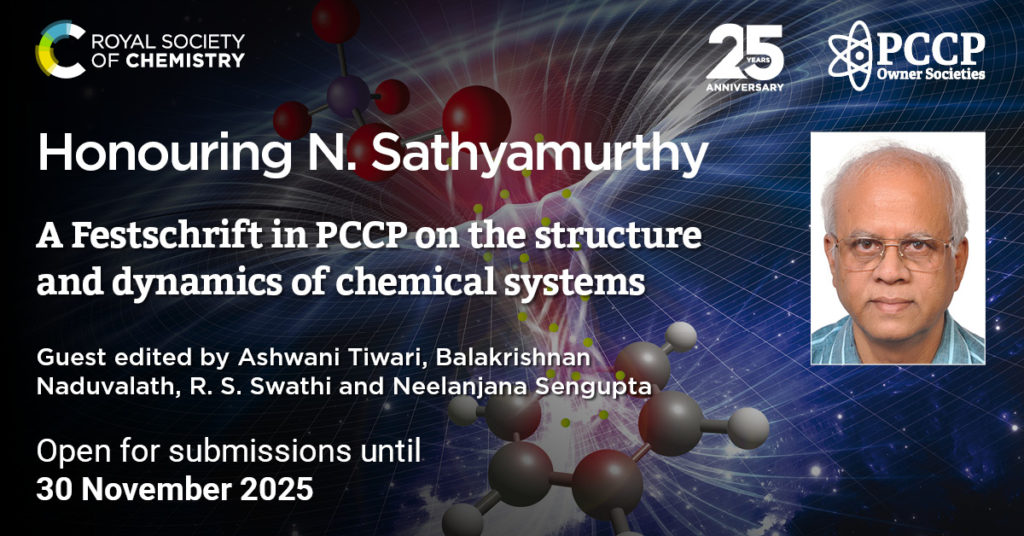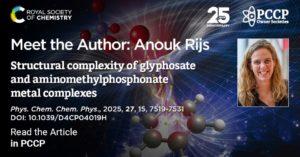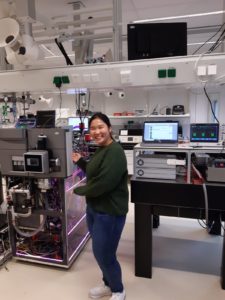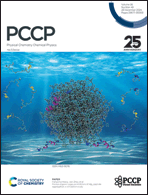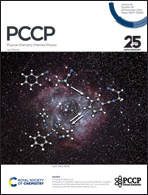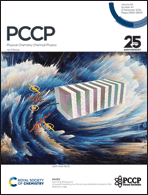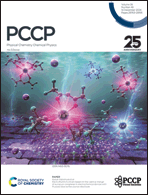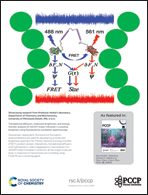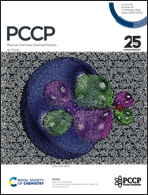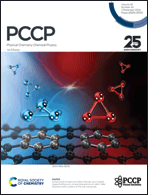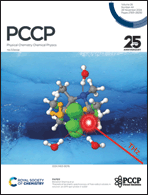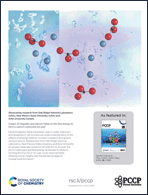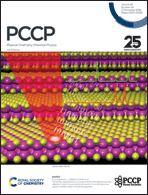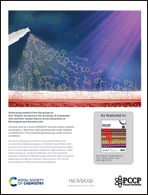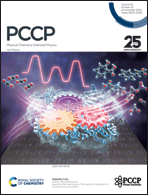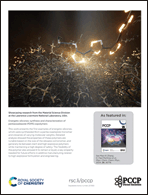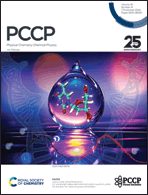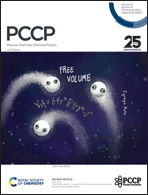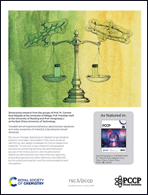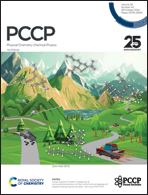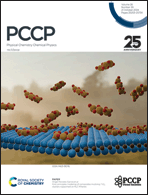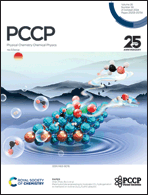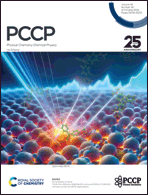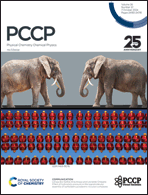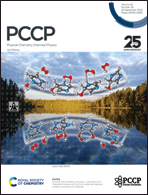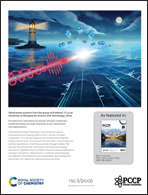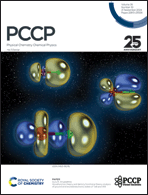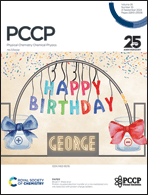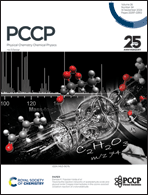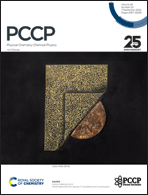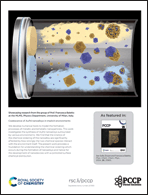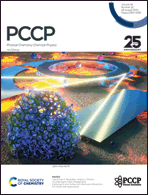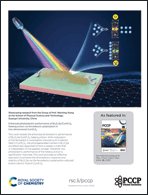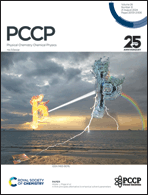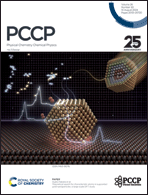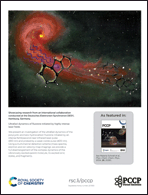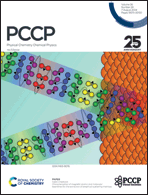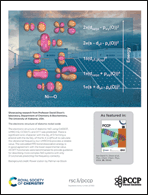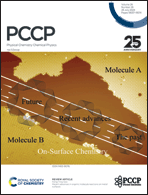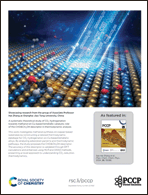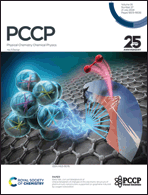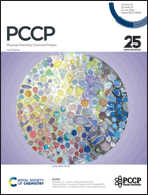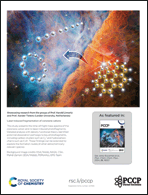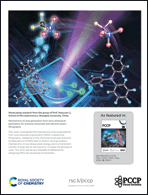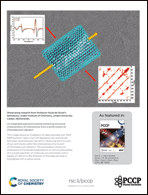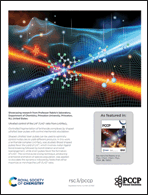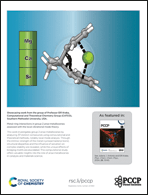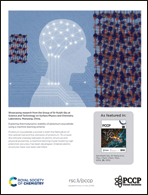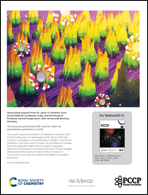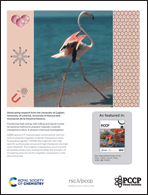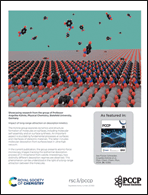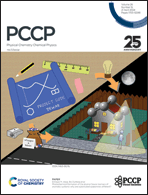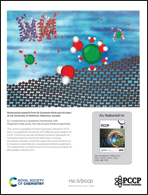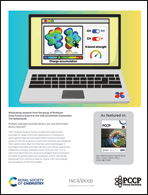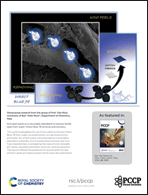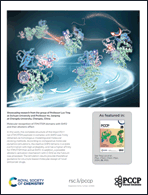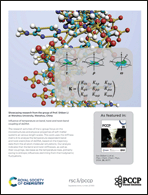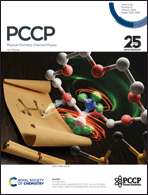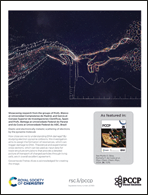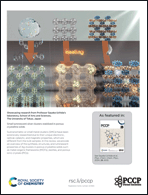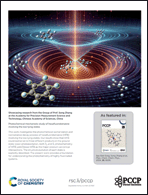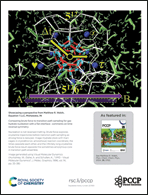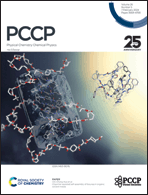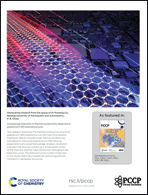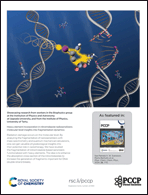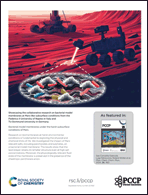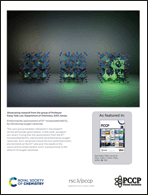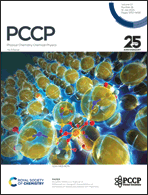 |
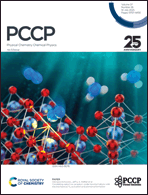 |
||
| Enhanced ion-transport characteristics of pyrrolidinium-based electrolytes with Mg(FSA)2
Yoshifumi Hirotsu, Mizuki Kimura, Shinkoh Nanbu, Yuko Takeoka, Masahiro Rikukawa and Masahiro Yoshizawa-Fujita Phys. Chem. Chem. Phys., 2025, 27, 13826 DOI:10.1039/D5CP01386K |
Correlating reductive vanadium oxide transformations with electrochemical N2 activation and ammonia formation
Kabirat Balogun, Qasim Adesope, Stella Amagbor, Agbara Tochi, Adam Vass, Guido Mul, Christoph Baeumer, Georgios Katsoukis and Jeffry A. Kelber Phys. Chem. Chem. Phys., 2025, 27, 13836 DOI:10.1039/D5CP00554J |
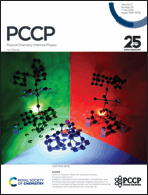 |
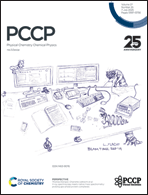 |
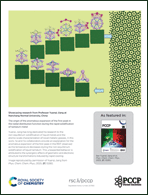 |
|
| Different mechanisms for lanthanide(III) sensitization and Yb-field-induced single-molecule magnet behaviour in a series of pentagonal bipyramidal and octahedral lanthanide complexes with axial phosphine oxide ligands
Hadjer Allia, Ana Rodríguez-Expósito, María A. Palacios, Juan-Ramón Jiménez, Albano N. Carneiro Neto, Renaldo T. Moura, Fabio Piccinelli, Amparo Navarro, María Mar Quesada-Moreno and Enrique Colacio Phys. Chem. Chem. Phys., 2025, 27, 13266 DOI:10.1039/D4CP04862H |
X-ray spectroscopy meets native mass spectrometry: probing gas-phase protein complexes
Jocky C. K. Kung, Alan Kádek, Knut Kölbel, Steffi Bandelow, Sadia Bari, Jens Buck, Carl Caleman, Jan Commandeur, Tomislav Damjanović, Simon Dörner, Karim Fahmy, Lara Flacht, Johannes Heidemann, Khon Huynh, Janine-Denise Kopicki, Boris Krichel, Julia Lockhauserbäumer, Kristina Lorenzen, Yinfei Lu, Ronja Pogan, Jasmin Rehmann, Kira Schamoni-Kast, Lucas Schwob, Lutz Schweikhard, Sebastian Springer, Pamela H. W. Svensson, Florian Simke, Florian Trinter, Sven Toleikis, Thomas Kierspel and Charlotte Uetrecht Phys. Chem. Chem. Phys., 2025, 27, 13234 DOI:10.1039/D5CP00604J |
The origin of the anomalous expansion of the first peak in the radial distribution function during the rapid solidification of tantalum metal
Yuanqi Jiang, Dadong Wen, Qiang Xu, Jian Lv, Rui Zhao and Ping Peng Phys. Chem. Chem. Phys., 2025, 27, 13280 DOI:10.1039/D5CP00247H |
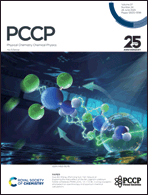 |
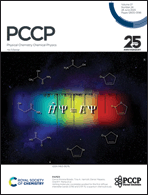 |
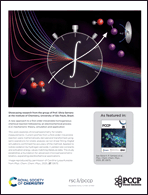 |
|
| Exploring the trans effect of the NH3 ligand in platinum halide complexes Pt(NH3)ClX2− (X = Cl, Br, I) using cryogenic photoelectron spectroscopy and quantum chemical calculations
Qixu Zhao, Jian Zhang, Xueying Li, Peng Tang, Fan Yang, Junyang Ma, Zhubin Hu, Haitao Sun, Xue-Bin Wang, Zhenrong Sun and Yan Yang Phys. Chem. Chem. Phys., 2025, 27, 12657 DOI:10.1039/D5CP00807G |
Vetting molecular candidates posited for the first diffuse interstellar bands (5780 and 5797 Å): a quantum chemical study
Halis Seuret, Ailish D. Sullivan, Cercis Morera-Boado, Tina A. Harriott, Daniel Majaess, Lou Massa and Chérif F. Matta Phys. Chem. Chem. Phys., 2025, 27, 12666 DOI:10.1039/D4CP04023F |
A new approach to a first order irreversible homogeneous chemical reaction followed by an electrochemical process (CiE mechanism): theory, simulation and application
Rafael A. L. Chioquetti, Raphael P. Bacil and Silvia H. P. Serrano Phys. Chem. Chem. Phys., 2025, 27, 12675 DOI:10.1039/D4CP04092A |
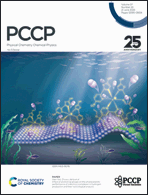 |
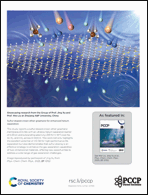 |
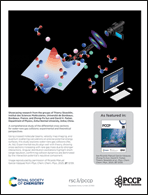 |
|
| Effect of anchoring groups on the photocatalytic performance of iridium(III) complexes in hydrogen production and their toxicological analysis
Xiao Yao, Linyu Fan, Zhuwu Jiang, Chaoqun Zheng, Jinfeng Chen, Yachen Jiang, Yisang Lu, Cheuk-Lam Ho and Yuanmei Chen Phys. Chem. Chem. Phys., 2025, 27, 12129 DOI:10.1039/D4CP04828H |
Sulfur-doped crown ether graphane for enhanced helium separation
Qinglan Zhao, Yingying Fu, Xiaxia Gong, Wenming Lu, Lin Dai, Wei Liu and Jing Xu Phys. Chem. Chem. Phys., 2025, 27, 12152 DOI:10.1039/D5CP00957J |
A comprehensive study of the differential cross sections for water–rare gas collisions: experimental and theoretical perspectives
Ricardo Manuel García-Vázquez, Zhong-Fa Sun, Chung-Hsin Yang, Lisán David Cabrera-González, Otoniel Denis-Alpizar, Philippe Halvick, David H. Parker and Thierry Stoecklin Phys. Chem. Chem. Phys., 2025, 27, 12139 DOI:10.1039/D4CP04825C |
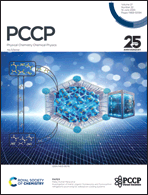 |
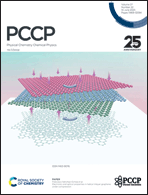 |
||
| Investigation of metal–organic frameworks and fluorocarbon refrigerants promising for adsorption cooling systems
Dipankar Singha, Debansh Mohapatra and Malay Kumar Rana Phys. Chem. Chem. Phys., 2025, 27, 11530 DOI:10.1039/D4CP04816D |
Electronic and optical properties in helical trilayer graphene under compression
Ossiel Aguilar-Spíndola, Alberto Rubio-Ponce, Florentino López-Urías and Francisco Sánchez-Ochoa Phys. Chem. Chem. Phys., 2025, 27, 11541 DOI:10.1039/D5CP00337G |
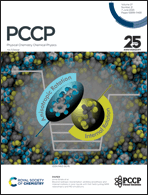 |
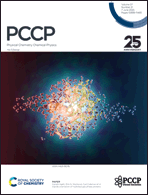 |
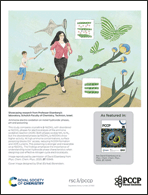 |
|
| Beyond isotropic reorientation: probing anisotropic and internal motions in ionic liquids with fast field cycling NMR relaxometry and MD simulations
Lennart Kruse, Tanja van Alphen, Johanna Busch, Dietmar Paschek, Ralf Ludwig and Anne Strate Phys. Chem. Chem. Phys., 2025, 27, 10927 DOI:10.1039/D5CP00582E |
Dipole orientation of hydrated gas phase proteins
Harald Agelii, Ellen L. S. Jakobsson, Emiliano De Santis, Gideon Elfrink, Thomas Mandl, Erik G. Marklund and Carl Caleman Phys. Chem. Chem. Phys., 2025, 27, 10939 DOI:10.1039/D5CP00073D |
Ammonia electro-oxidation on nickel hydroxide: phases, pH and poisoning
Inbal Offen-Polak, Hilla Ayali Aviram, Adan Hijaze, Thierry K. Slot and David Eisenberg Phys. Chem. Chem. Phys., 2025, 27, 10949 DOI:10.1039/D4CP02950J |
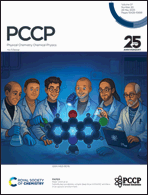 |
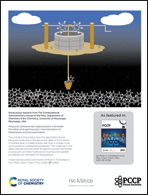 |
||
| Substituted acridones: simple deep blue HIGHrISC emitters in an aprotic environment
Matthias Jantz, David Klaverkamp, Lennart Bunnemann, Martin Kleinschmidt, Constantin Czekelius and Peter Gilch Phys. Chem. Chem. Phys., 2025, 27, 10444 DOI:10.1039/D4CP04781H |
Polycyclic (anti)aromatic hydrocarbons: interstellar formation and spectroscopic characterization of biphenylene and benzopentalene
Athena R. Flint, Vincent J. Esposito and Ryan C. Fortenberry Phys. Chem. Chem. Phys., 2025, 27, 10456 DOI:10.1039/D5CP00630A |
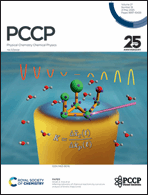 |
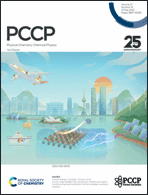 |
||
| Inferring networks of chemical reactions by curvature analysis of kinetic trajectories
Vignesh Narayanan, Lawrence K. Bordoh, István Z. Kiss and Jr-Shin Li Phys. Chem. Chem. Phys., 2025, 27, 9962 DOI:10.1039/D4CP04338C |
A non-metal doped VTe2 monolayer: theoretical insights into the enhanced mechanism for the hydrogen evolution reaction
Yanwei Wang, Guofeng Li, Jisong Hu, Ge Gao, Ying Zhang, Guangxia Shi, Xu Yang, Lei Zhang, Ling Fang and Yinwei Li Phys. Chem. Chem. Phys., 2025, 27, 9970 DOI:10.1039/D5CP00670H |
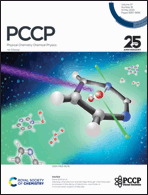 |
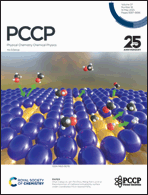 |
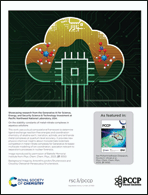 |
|
| Interplay of protection and damage through intermolecular processes in the decay of electronic core holes in microsolvated organic molecules
Dana Bloß, Nikolai V. Kryzhevoi, Jonas Maurmann, Philipp Schmidt, André Knie, Johannes H. Viehmann, Catmarna Küstner-Wetekam, Sascha Deinert, Gregor Hartmann, Florian Trinter, Lorenz S. Cederbaum, Arno Ehresmann, Alexander I. Kuleff and Andreas Hans Phys. Chem. Chem. Phys., 2025, 27, 9329 DOI:10.1039/D4CP03907F |
Decomposition of methanol activated by surface under-coordinated Pd on layered PdTe2
Jing-Wen Hsueh, Lai-Hsiang Kuo, Po-Han Chen, Wan-Hsin Chen, Chi-Yao Chuang, Chia-Nung Kuo, Chin-Shan Lue, Hung-Wei Shiu, Bo-Hong Liu, Chia-Hsin Wang, Yao-Jane Hsu, Chun-Liang Lin, Jyh-Pin Chou and Meng-Fan Luo Phys. Chem. Chem. Phys., 2025, 27, 9336 DOI:10.1039/D5CP00130G |
On the stability constants of metal–nitrate complexes in aqueous solutions
Mohammadhasan Dinpajooh, Greta L. Hightower, Richard E. Overstreet, Lori A. Metz, Neil J. Henson, Niranjan Govind, Andrew M. Ritzmann and Nicolas E. Uhnak Phys. Chem. Chem. Phys., 2025, 27, 9350 DOI:10.1039/D4CP04295F |
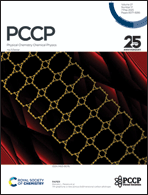 |
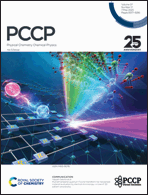 |
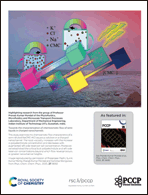 |
|
| TH-graphyne: a new porous bidimensional carbon allotrope
Kleuton A. L. Lima, Rodrigo A. F. Alves, Daniel A. da Silva, Fábio L. L. Mendonça, Marcelo L. Pereira and Luiz A. Ribeiro Phys. Chem. Chem. Phys., 2025, 27, 8684 DOI:10.1039/D4CP02923B |
Multidimensional quantum Fourier transform for nanosheet material evaluation by electron microscopy: a case of 2D pattern processing
Hiroshi Sampei, Tetsuya Mizuguchi, Koki Saegusa, Makoto Nakamura, Koichi Kimura and Yasushi Sekine Phys. Chem. Chem. Phys., 2025, 27, 8656 DOI:10.1039/D4CP04399E |
Towards the characterization of chemiosmotic flow of ionic liquids in charged nanochannels
Prasenjeet Padhi, Sumit Kumar Mehta, Pranab Kumar Mondal and Somchai Wongwises Phys. Chem. Chem. Phys., 2025, 27, 8692 DOI:10.1039/D5CP00555H |
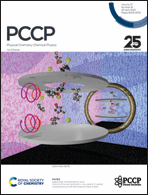 |
|||
| Control of circular dichroism in ion yield of 3-methyl cyclopentanone with femtosecond laser pulses
Sagnik Das, Jayanta Ghosh, Sudheendran Vasudevan, Simon T. Ranecky, Tonio Rosen, Nicolas Ladda, Han-gyeol Lee, Till-Jakob Stehling, Fabian Westmeier, Jochen Mikosch, Arne Senftleben, Thomas Baumert and Hendrike Braun Phys. Chem. Chem. Phys., 2025, 27, 8043 DOI:10.1039/D4CP04572F |
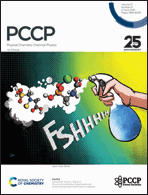 |
|||
| Structural complexity of glyphosate and aminomethylphosphonate metal complexes
Olivia Rusli, Oscar H. Lloyd Williams, Papri Chakraborty, Marco Neumaier, Frank Hennrich, Sjors Bakels, Kevin Hes, Anouk M. Rijs, Boris Ucur, Shane R. Ellis, River J. Pachulicz, Tara L. Pukala and Nicole J. Rijs Phys. Chem. Chem. Phys., 2025, 27, 7519 DOI:10.1039/D4CP04019H |
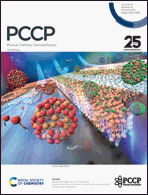 |
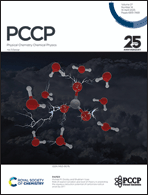 |
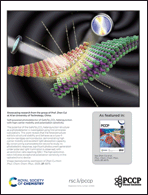 |
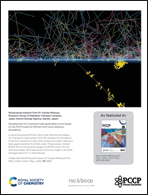 |
| Direct observation of interactions between supported lipid bilayers and surfactants
Masaki Hanzawa, Hiroaki Sugasawa, Taku Ogura, Ken-ichi Iimura and Takeshi Misono Phys. Chem. Chem. Phys., 2025, 27, 6858 DOI:10.1039/D4CP04449E |
Role of explicit solvation and level of theory in predicting the aqueous reduction potential of carbonate radical anion by DFT
Michael R. Dooley and Shubham Vyas Phys. Chem. Chem. Phys., 2025, 27, 6867 DOI:10.1039/D4CP04487H |
Self-powered photodetector of GaN/Sc2CCl2 heterojunction with high carrier mobility and polarization sensitivity
Guoqing Zhang, Zhen Cui, Aming Song, Shuang Zhang and Lu Wang Phys. Chem. Chem. Phys., 2025, 27, 6875 DOI:10.1039/D4CP04162C |
Development of a chemical code applicable to ions based on the PHITS code for efficient and visual radiolysis simulations
Yusuke Matsuya, Yuji Yoshii, Tamon Kusumoto, Tatsuhiko Ogawa, Seiki Ohnishi, Yuho Hirata, Tatsuhiko Sato and Takeshi Kai Phys. Chem. Chem. Phys., 2025, 27, 6887 DOI:10.1039/D4CP04216F |
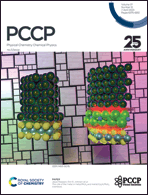 |
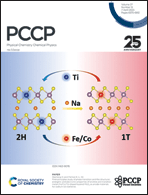 |
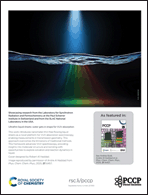 |
|
| The role of the metal in metal/MoS2 and metal/Ca2N/MoS2 interfaces
Adrian F. Rumson, Mohammad Rafiee Diznab, Jesse Maassen and Erin R. Johnson Phys. Chem. Chem. Phys., 2025, 27, 6438 DOI:10.1039/D4CP04577G |
First-principles study of phase transition and the structural, energetic and electronic properties of pristine and transition metal (Fe/Co/Ti)-doped layered MoS2 as anode materials for sodium-ion batteries
Wenlong Xi and Patrick H.-L. Sit Phys. Chem. Chem. Phys., 2025, 27, 6447 DOI:10.1039/D5CP00286A |
Ultrathin liquid sheets: water gets in shape for VUV absorption
Jonas Knurr, Patrick Hemberger, Patrick Ascher, Sven Augustin, David J. Hoffman, Gregor Knopp, Samuel Menzi, Zhibin Sun, Simon Tiefenbacher, Reto Wetter, Jake D. Koralek, Antoine Sarracini, Kirsten Schnorr, Christoph Bostedt, Andras Bodi and Andre Al Haddad Phys. Chem. Chem. Phys., 2025, 27, 6457 DOI:10.1039/D4CP04619F |
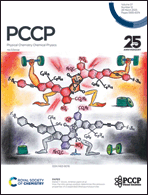 |
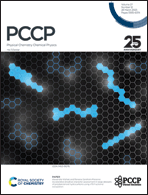 |
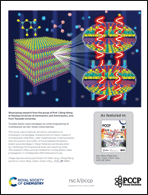 |
|
| How the nitro group position determines the emission properties of π-expanded diketopyrrolopyrroles
Kamil Skonieczny, Francesco Di Maiolo, Sara Venturi, Alessandro Iagatti, Alessandro Ricci, Francesco Bertocchi, Daniel T. Gryko and Andrea Lapini Phys. Chem. Chem. Phys., 2025, 27, 5965 DOI:10.1039/D4CP04689G |
Accelerated diradical character assessment in large datasets of polybenzenoid hydrocarbons using xTB fractional occupation
Alexandra Wahab and Renana Gershoni-Poranne Phys. Chem. Chem. Phys., 2025, 27, 5973 DOI:10.1039/D4CP04059G |
Tunable elastic wave bandgaps by strain engineering of multilayered van der Waals metamaterials
Yabin Jing, Lifeng Wang and Eric Li Phys. Chem. Chem. Phys., 2025, 27, 5984 DOI:10.1039/D4CP03540B |
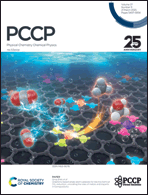 |
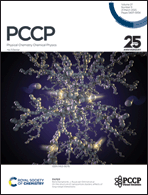 |
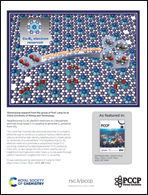 |
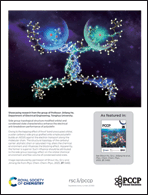 |
| Graphene-based single-atom catalysts for electrochemical CO2 reduction: unraveling the roles of metals and dopants in tuning activity
Colin Gallagher, Manish Kothakonda and Qing Zhao Phys. Chem. Chem. Phys., 2025, 27, 5464 DOI:10.1039/D4CP04212C |
On the structure of nanoparticle clusters: effects of long-range interactions
Rens Kamphorst, Maximilian F. Theisen, Ankur D. Bordoloi, Samir Salameh, Gabrie M. H. Meesters and J. Ruud van Ommen Phys. Chem. Chem. Phys., 2025, 27, 5476 DOI:10.1039/D4CP04235B |
Neighbouring Cu–B6 electron reservoirs in α-borophene promote long-range C–C coupling to generate C2 products from CO2
Hongguang Wang, Peiyao Bai, Yiming Ren, Shilin Wei and Lang Xu Phys. Chem. Chem. Phys., 2025, 27, 5494 DOI:10.1039/D4CP04618H |
Side group topological structure modified orbital and condensed state characteristics enhance the electrical anti-breakdown performance of polyolefin
Shixun Hu, Cheng Tong, Xiongjie Yang, Shangshi Huang, Jun Hu, Qi Li and Jinliang He Phys. Chem. Chem. Phys., 2025, 27, 5482 DOI:10.1039/D4CP03902E |
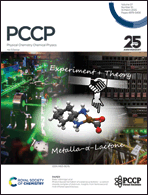 |
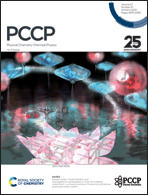 |
||
| Photoinduced formation of a platina-α-lactone – a carbon dioxide complex of platinum. Insights from femtosecond mid-infrared spectroscopy
Markus Bauer, Raphaela Post, Luis I. Domenianni and Peter Vöhringer Phys. Chem. Chem. Phys., 2025, 27, 5012 DOI:10.1039/D4CP03840A |
Investigating Ni nanoparticles on CeO2 for methane dissociation: a comparative study of theoretical calculations and experimental insights
Takaya Fujisaki, Yuta Tsuji, Phuc Hoan Tu, Tin Chanh Duc Doan, David S. Rivera Rocabado, Aleksandar Tsekov Staykov, Keiji Yashiro and Yusuke Shiratori Phys. Chem. Chem. Phys., 2025, 27, 5024 DOI:10.1039/D4CP01324G |
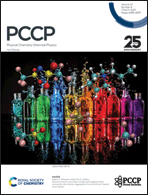 |
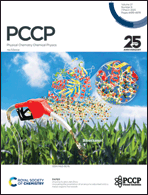 |
||
| Structure factor line shape model gives approximate nanoscale size of polar aggregates in pyrrolidinium-based ionic liquids
Ralph A. Wheeler and Emily E. Dalbey Phys. Chem. Chem. Phys., 2025, 27, 4593 DOI:10.1039/D4CP04488F |
Unraveling the orientation of an enzyme adsorbed onto a metal–organic framework
Zhiyong Xu and Jian Zhou Phys. Chem. Chem. Phys., 2025, 27, 4603 DOI:10.1039/D4CP01649A |
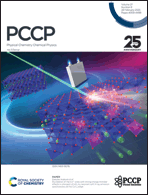 |
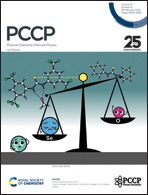 |
||
| Elucidation of the Co4+ state with strong charge-transfer effects in charged LiCoO2 by resonant soft X-ray emission spectroscopy at the Co L3 edge
Daisuke Asakura, Takaaki Sudayama, Yusuke Nanba, Eiji Hosono, Hisao Kiuchi, Kosuke Yamazoe, Jun Miyawaki, Yoshihisa Harada, Atsuo Yamada, Ru-Pan Wang and Frank M. F. de Groot Phys. Chem. Chem. Phys., 2025, 27, 4092 DOI:10.1039/D4CP03759F |
Urea hydrogen-bond donor strengths: bigger is not always better
Celine Nieuwland, Angelina N. van Dam, F. Matthias Bickelhaupt and Célia Fonseca Guerra Phys. Chem. Chem. Phys., 2025, 27, 4099 DOI:10.1039/D4CP04042B |
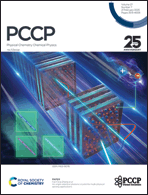 |
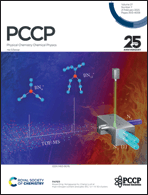 |
||
| An angle-selective photonic crystal for multi-physical sensing applications
Na Pei, Bao-Fei Wan, Hao-Cheng Ma, Ting-Hao Zhang, Sen Hong and Hai-Feng Zhang Phys. Chem. Chem. Phys., 2025, 27, 3558 DOI:10.1039/D4CP03468F |
High-nitrogen-content energetic BNn+ (n = 4–16) clusters
Jiale Li, Meicheng Chen, Kaiwen Liu, Kewei Ding, Hongguang Xu, Weijun Zheng and Cheng Lu Phys. Chem. Chem. Phys., 2025, 27, 3567 DOI:10.1039/D4CP03566F |
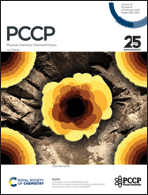 |
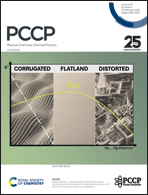 |
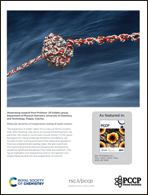 |
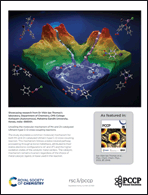 |
| Flow-driven pattern formation during coacervation of xanthan gum with a cationic surfactant
Y. Stergiou, A. Perrakis, A. De Wit and K. Schwarzenberger Phys. Chem. Chem. Phys., 2025, 27, 2920 DOI:10.1039/D4CP01055H |
Controlling orbital ordering of intergrowth structures with flat [Ag(II)F2] layers to mimic oxocuprates(II)
Daniel Jezierski, José Lorenzana and Wojciech Grochala Phys. Chem. Chem. Phys., 2025, 27, 2927 DOI:10.1039/D4CP04145C |
Molecular dynamics of evaporative cooling of water clusters
Martin Klíma, Jiří Janek and Jiří Kolafa Phys. Chem. Chem. Phys., 2025, 27, 2939 DOI:10.1039/D4CP03980G |
Unveiling the molecular mechanism of Mn and Zn-catalyzed Ullmann-type C–O cross-coupling reactions
C. Rajalakshmi, Parvathi Santhoshkumar, Lydia Elizabeth Mathews, Ann Miriam Abraham, K. R. Rohit, Gopinathan Anilkumar and Vibin Ipe Thomas Phys. Chem. Chem. Phys., 2025, 27, 2948 DOI:10.1039/D4CP02777A |
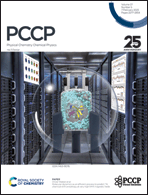 |
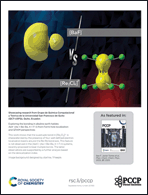 |
||
| Molecular dynamics as an efficient process to predict 15N chemical shift anisotropy at very high NMR magnetic fields
Maggy Hologne, Po-Chia Chen, François-Xavier Cantrelle and Olivier Walker Phys. Chem. Chem. Phys., 2025, 27, 2320 DOI:10.1039/D4CP03821E |
Exploring the bonding in alkaline earth halides AeX− (Ae = Be–Ba, X = F–I) from Fermi hole localization and QTAIM perspectives
Luis Rincon, Valeria Bedoya, Luis E. Seijas, Vladimir Rodríguez, Cesar Zambrano and F. Javier Torres Phys. Chem. Chem. Phys., 2025, 27, 2333 DOI:10.1039/D4CP04332D |
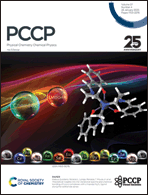 |
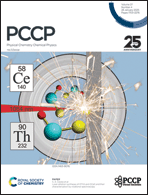 |
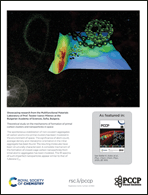 |
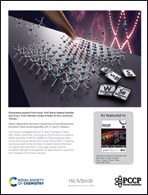 |
| Theoretical insights into the vibrational spectra and chemical bonding of Ln(III) complexes with a tripodal N4O3 ligand along the lanthanide series
Francielle C. Machado, Mateus Quintano, Carlos V. Santos-Jr, Albano N. Carneiro Neto, Elfi Kraka, Ricardo L. Longo and Renaldo T. Moura Jr. Phys. Chem. Chem. Phys., 2025, 27, 1794 DOI:10.1039/D4CP03677H |
Laser ablation syntheses of OThS and OCeS and their characterization by rotational spectroscopy
Joshua E. Isert, Alexander R. Davies, G. S. Grubbs II and S. A. Cooke Phys. Chem. Chem. Phys., 2025, 27, 1804 DOI:10.1039/D4CP04382K |
Theoretical study on the mechanisms of formation of primal carbon clusters and nanoparticles in space
Dobromir A. Kalchevski, Dimitar V. Trifonov, Stefan K. Kolev, Valentin N. Popov, Hristiyan A. Aleksandrov and Teodor I. Milenov Phys. Chem. Chem. Phys., 2025, 27, 1819 DOI:10.1039/D4CP02865A |
Defect dependent electronic properties of two-dimensional transition metal dichalcogenides (2H, 1T, and 1T′ phases)
Berna Akgenc Hanedar and Mehmet Cengiz Onbaşlı Phys. Chem. Chem. Phys., 2025, 27, 1809 DOI:10.1039/D4CP04017A |
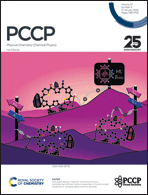 |
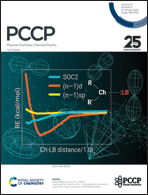 |
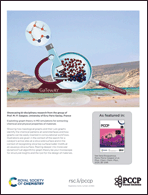 |
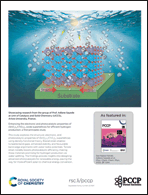 |
| Deciphering nonlinear optical properties in functionalized hexaphyrins via explainable machine learning
Eline Desmedt, Michiel Jacobs, Mercedes Alonso and Freija De Vleeschouwer Phys. Chem. Chem. Phys., 2025, 27, 1256 DOI:10.1039/D4CP03303E |
Exploring the influence of (n − 1)d subvalence correlation and of spin–orbit coupling on chalcogen bonding
Nisha Mehta and Jan M. L. Martin Phys. Chem. Chem. Phys., 2025, 27, 1274 DOI:10.1039/D4CP01877J |
Exploiting graph theory in MD simulations for extracting chemical and physical properties of materials
Sana Bougueroua, Alexander A. Kolganov, Chloé Helain, Coralie Zens, Dominique Barth, Evgeny A. Pidko and Marie-Pierre Gaigeot Phys. Chem. Chem. Phys., 2025, 27, 1298 DOI:10.1039/D4CP02764G |
Enhancing the electronic and photocatalytic properties of (SnO2)n/(TiO2)m oxide superlattices for efficient hydrogen production: a first-principles study
Najwa Harrati, Bastien Casier and Adlane Sayede Phys. Chem. Chem. Phys., 2025, 27, 1284 DOI:10.1039/D4CP03363A |
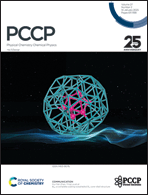 |
|||
| B92: a complete coating icosahedral B12 core–shell structure
Yi-Sha Chen, Jing-Jing Guo, Peng-Bo Liu, Hui-Yan Zhao, Jing Wang and Ying Liu Phys. Chem. Chem. Phys., 2025, 27, 655 DOI:10.1039/D4CP03471F |
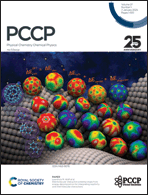 |
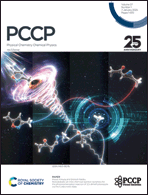 |
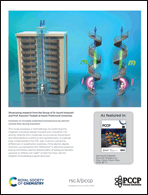 |
|
| Intermolecular interaction potential maps from energy decomposition for interpreting reactivity and intermolecular interactions
Amin Kiani, Wentong Zhou and Lawrence M. Wolf Phys. Chem. Chem. Phys., 2025, 27, 47 DOI:10.1039/D4CP03237C |
Nonadiabatic ab initio chemical reaction dynamics for the photoisomerization reaction of 3,5-dimethylisoxazole via the S1 electronic state
Mizuki Kimura and Shinkoh Nanbu Phys. Chem. Chem. Phys., 2025, 27, 62 DOI:10.1039/D4CP03137G |
Inversion of circularly polarized luminescence by electric current flow during transition
Ayumi Imayoshi, Shinya Fujio, Yuuki Nagaya, Misato Sakai, Atsushi Terazawa, Misa Sakura, Keita Okada, Takahiro Kimoto, Tadashi Mori, Yoshitane Imai, Masahiko Hada and Kazunori Tsubaki Phys. Chem. Chem. Phys., 2025, 27, 77 DOI:10.1039/D4CP02968B |











